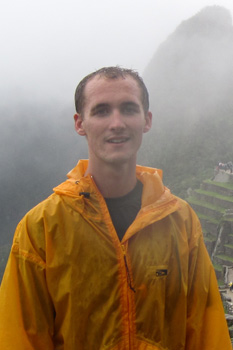 Kevin O’Malley
Kevin O’Malley
Biochemistry and Molecular Biology
Synthesis of New Heterocyclic Inhibitors of the Helicase of the Hepatitis C Virus
Mentor: Dr. Paul Smith
The natural product UK-1 is known to catalytically inhibit the enzyme DNA topoisomerase II (topo II) and is also known to kill cancer cells in culture. Our goal is to identify where UK-1 binds to topo II using photoaffinity labeling. We will synthesize a photochemically reactive analog of UK-1 which will covalently attach to the enzyme binding site when irradiated with light. Protein digestion followed by liquid chromatography and mass spectrometry will identify the protein residues attached to UK-1. The results will provide an understanding of the mechanism of inhibition as well as guide the synthesis of better inhibitors related to UK-1 with the long-term goal of identifying clinically useful anti-cancer drugs.
How did you find your mentor for this project?
I was taking Dr. Smith’s Mechanisms of Organic Reactions class and really enjoyed it. I looked forward to class and got excited about doing the homework. One day I asked Dr. Smith if he had room in the lab, and after a week or so, he said yes.
What academic background did you have before you started this research? Did your mentor help you?
I was a junior biochemistry and molecular biology major and had taken both biochemistry, and organic chemistry classes. I wanted to do biomedical research and liked organic chemistry. The research required few afternoons each week in the lab and an occasional Friday morning. Dr. Smith worked one-on-one with me. I did the work and he was there for guidance and the occasional helping hand. He also helped me interpret a lot of the spectral data and troubleshoot when experiments didn’t go as perfectly as we had hoped.
You did a different project for the summer of 2010. What was that?
I worked full-time for 10 weeks on a project at the Johns Hopkins Malaria Institute. A representative from the Institute came to UMBC in the spring to give a short presentation of his research. He is a protein X-ray crystallography who does rational drug design from a structural biology perspective. I really liked how visual his work was and thought his strategy was really exciting. I showed my interest by asking questions during and after the presentation and through a follow up e-mail.
How did you know this was the project you wanted to do?
Malaria is one of the most socioeconomically crippling diseases. In recent years it has been making a comeback due to drug resistant strains. There are many factors that keep people in the developing world from living a good life; malaria is a serious one, and it is one we can fix. I really wanted to work with someone who was doing Malaria work. Dr. Bosch’s project stood out because it involved some things I knew as well as some new things and some things I thought were cool, and it was on a topic I cared about. I knew about rational drug design, but had never experienced it from a structural biology perspective. I think protein 3D structure is endlessly fascinating, and malaria concerns me greatly.
How did you hear about the summer opportunity?
Dean Rous got me excited about malaria research which motivated me to apply when the internship was posted on UMBCworks. Kevin, how does this related to the answer to the first malaria question? Can we combine the two into one question and answer?
How much did your mentor help you with the work this summer?
He worked one-on-one with me while I was learning the basic procedures and after that he was always near if I had a question. I was following his plan but he gave me a lot of freedom to design experiments. Often times the data were really confusing, but I could count on him to help me figure things out and give moral support when experiments didn’t work.
What is your advice to other students about getting involved in research?
\Start talking to researchers. Professors are a great place to start because you already have a reason to see them in class. Ask them about their research and what they do. If it sounds interesting than ask if you can work with them. Even if they don’t have room or the time they can certainly connect you with another researcher who does.
What are your career goals?
I am very interested in medicine and biomedical science, specifically nutrition from a biochemical perspective, and rational drug design. I may pursue a duel degree like an MD/PhD or an MD/MPH or just an MD. I am torn between being a primary care doctor or a physician scientist.
What has been the hardest part about your research?
Failed experiments and unsatisfactory results. They can be pretty disheartening. However, as annoying as they are, they are actually the best part of research. They are like lighthouses that tell you when you’re going in the wrong direction. When you’re lucky, the sometimes even provide a clue for what you should do next.
What was the most unexpected thing?
How long it can take to do things. I’m the kind of person who likes things now! Research can be a good lesson in patience.
How does your research relate to your work in other classes?
Obviously my classes provided the theoretical basis for the research. Interestingly enough, I have found that the relationship works both ways. More often than not my work in lab helps cement and expand on concepts that I learned in class.
 Kevin O’Malley
Kevin O’Malley